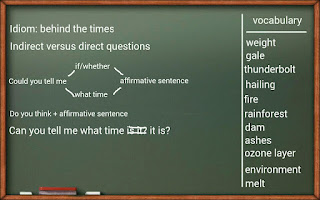Listen to Evan doing a tour of his fridge and explaining what's inside. Say whether the statements are true or false.
27 April 2016
26 April 2016
Idioms
25 April 2016
B1 class 25/04/2016
 |
| Picture 1 |
We have started the class as usual, with the idiom of the day. This time it's related to food as this is what we've been looking at lately. The idiom is an egg head. Tomorrow I'll publish the meaning.
Then we corrected the homework, exercise 9 on page 65 about the use of quantifiers.
After this we used some visuals (picture 1) to practise containers and quantifiers. Students sent pictures of their fridges and in pairs they had to describe them and guess who each fridge belonged to. From this fridge we could say there are plenty of cans of coke and beer and too many cartons of milk.
 |
| Picture 2 |
The next activity also included visuals. With a picture of some food students again in pairs had to organise a dinner party for four people saying whether the food and drinks hey had was enough or they had do the shopping.
Some expressions were provided in order to help students produce their conversation. Those expressions included pieces of grammar we had already seen in class such as indirect questions or future expressions like in case. In the end most of the students decided to cook spaghetti carbonara and a salad, and they agreed some more beer was necessary.
 |
| Picture 3 |
To introduce the next activities students explained what their favourite places for swimming were, river, sea or swimming pool. After this we continued the lesson with a listening activity about shark attacks on the American coast. This was related to the last piece of homework, a reading comprehension about a shark attack. To finish the lesson the structure of a formal letter to the Mayor of Valencia was explained. On the blackboard (picture 3) you can see a detailed explanation of the things to be included in the letter.
Composition 8: Social media are a threat to personal relationships
Most people have an
account in social media. Facebook,Twitter and Instagram have a lot of
users in the world. Nowadays, social networking has increased so much
in the last.
Firstly, some people
think social media can affect the relationships between persons.
Users of Facebook should be careful when they upload photos and
videos because a lot of people can see these publications. In
addition to this, some people use photos in order to harm the social
life of people.
Secondly, other
people think social media can be positive about prvate life.
Moreover, these people believe social media can allow you to meet new
friends and promote your popularity among their friends.
Thirdly, some people
can have a big troubles in social media. For example, in some schools
they can produce cases of cyberbulling. These cases are produced
classmates disturb some children in social networking. In the last
years, when these cases have increased a lot.
To sum up, everubody
are aware of the dangers of social media. From my point of view,
people should be careful with the publications they share with many
people.
22 April 2016
Idioms
Idiom of the day:
Be on cloud nine.
This idiom related to weather means a state of euphoria or perfect happines.
Jim has a new girlfriend and he seems very much in love, he's on cloud nine.
21 April 2016
B1 class 20/04/2016
Yesterday we continued with idioms related to weather. This time the idiom of the day was Be on cloud nine. Some students quickly guessed the meaning and found the equivalent in Spanish.
Then it was time to check the homework, a couple of exercises on the use of the passive voice. After this we saw the different containers on page 64 that we used to describe the picture and talk about their relationship, eating habits and recycling habits. We provided some useful vocabulary that can be seen on the picture of the blackboard.

To check what we discussed we did the listening activity on that same page where the three people are talking about recycling.
To finish the lesson we had a look at the use of quantifiers to express larfe and small quantities with plural and uncountable nouns.
For homework students must do exercise 9 from page 65 and exercise 5 from page 67. I've also asked the students to send me a picture of what's inside their fridge for an activity we'll do next Monday.
20 April 2016
Containers and quantifiers
Hello everyone, today in class we have seen different containers and how to use quantifiers. Here is a quick video explanation I've made myself, I hope you like it.
Tomorrow I'll publish the post on today's lesson.
Tomorrow I'll publish the post on today's lesson.
Idioms
 |
| Google images |
Every cloud has a silver lining.
This idiom, although related to weather in form, has nothing to do with it. We may say this expression when after a bad experience or a problem we get something positive out of it.
I spent a whole week in bed because of gastroenteritis but hey, every cloud has a silver lining, I've lost 4 kilos.
19 April 2016
B1 class 18/04/2016
Yesterday the lesson started a bit differently, we discussed some vocabulary related to CRIME, which doesn't appear in this year's textbook but it's always good to know just in case. We saw the difference between rob and steal, and then the meaning of mug, burgle and kidnap.
Then we continued with the idiom of the day: every cloud has a silver lining. The previous class we looked at vocabulary related to weather and that's why the idiom is related to weather always has nothing to do with it.

After this we checked the homework on indirect questions and the reading exercise about natural disasters before explaining the form of the passive voice in different tenses. We practised this in conversation talking about places that had suffered natural disasters recently.
To finish the lesson we had a lively discussion about our recycling habits and what we do with certain products.
For homework students must do exercises 7 and 8 from page 63 and exercise 1 from page 64.
15 April 2016
Idioms
14 April 2016
B1 class 14/04/2016
 We have finally finished unit 7, the one related to technology and that's why the idiom of the day had to do with it: behind the times. Some of the students got the meaning right.
We have finally finished unit 7, the one related to technology and that's why the idiom of the day had to do with it: behind the times. Some of the students got the meaning right.
After seeing that we continued some grammar, direct versus indirect questions. Indirect questions are used in more formal situations, for example at work, when we want to sound more polite, asking for directions, or when we want to ask a controversial question, if someone is married for example.
Indirect questions are introduced by Could you tell me...? or Do you know...? After these we would use if/whether with yes/no questions or an interrrogative particle. Then we use the same structure as in affirmative sentences.
We practised this first on paper and then asking each other examples of controversial questions.
The we started unit 8. We saw some vocabulary related to natural disasters and we talked about weather conditions and natural disasters on TV and in our country.
For homework students must do exercise 6 and 7 from page 61; and 3c and d from page 62.
12 April 2016
Idioms
11 April 2016
B1 class 11/04/2016
 As usual we have started the lesson with the idiom of the day. In the last few lessons we have been studying vocabulary related to social media and that's why the idiom of the day is "go viral". Students had no problems guessing its meaning. We also provided some examples of viral pictures and videos.
As usual we have started the lesson with the idiom of the day. In the last few lessons we have been studying vocabulary related to social media and that's why the idiom of the day is "go viral". Students had no problems guessing its meaning. We also provided some examples of viral pictures and videos. Then we solved some problems with the homework: definite and indefnite articles. We didn't go though all the activities but I explained doubts and problems regarding the photocopies about articles.
Then we solved some problems with the homework: definite and indefnite articles. We didn't go though all the activities but I explained doubts and problems regarding the photocopies about articles.
To finish with the topic of social media students discussed in pairs stuations in which someone might be using his/her phone while everyone else is having a conversation. In order to do that students described the picture on page 59 where two people are having a conversation while another man is looking at his phone.
 This discussion served as the basis for the next writing activity: an opinion article about social media and personal relations. This type of essay requires 5 paragraphs, an introduction, 3 paragraphs where we discussed the viewpoints, and a conclusion. Here is very important the use of connectors and gvng examples to support the different arguments. The title of the essay is: "Social media are a threat to personal relationships".
This discussion served as the basis for the next writing activity: an opinion article about social media and personal relations. This type of essay requires 5 paragraphs, an introduction, 3 paragraphs where we discussed the viewpoints, and a conclusion. Here is very important the use of connectors and gvng examples to support the different arguments. The title of the essay is: "Social media are a threat to personal relationships".
Then the class focused mainly on practising listening. We did the listening activity on page 59; the 3 people from the picture are discussing how they use social media. To finish the lesson we did another listening activity on page 60. Students listen to 2 conversations, the first one happens at work and is quite formal, whereas the second one happens at home is more informal.
For homework students must read the tapescript for this last listening activity while listening to it on the DVD. Next class we will have a look at direct and indirect questions.
08 April 2016
Idioms
07 April 2016
B1 class 06/04/2016
As usual we started the lesson with the idiom of the day: bag of tricks. This time the meaning is quite literal but I'll post the explanation anyway.
We continued the lesson with a quick revision of the second conditional and then we checked the homework: exercise 5 from page 57. Students read the sentences out loud to practise the second conditional and then they asked another student to practise the secon conditional with questions.
 Meanwhile I explained one common mistake people make, using loose when they want to say lose. And also the different pronunciations for the grapheme -ch-.
Meanwhile I explained one common mistake people make, using loose when they want to say lose. And also the different pronunciations for the grapheme -ch-.
Next piece of homework was exercise 8 from page 57 as well; we corrected out loud explaining why we would choose first or second conditional.
Then we started section C of unit 7, the one about social networks and we saw some vocabulary related to this topic. Students in general we quite acquainted with this vocabulary as they normally use it every day. Related to this we checked the reading comprehension exercise on page 58.
To finish the lesson I explained the different uses of the definite and indefinite article, and when not to use an article. You may download some extra exercises here.
01 April 2016
Top 10 Common Mistakes Spanish Students Make in English
 |
| Made with www.easel.ly |
Subscribe to:
Posts (Atom)





